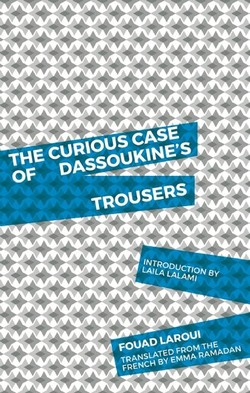Читать книгу The Curious Case of Dassoukine's Trousers - Fouad Laroui - Страница 6
На сайте Литреса книга снята с продажи.
ОглавлениеINTRODUCTION
Laila Lalami
A Saturday morning in Casablanca. Nagib and Hamid sit in a café, bored and about to have a pointless argument about an article from Le Matin du Sahara, when their friend Dadine offers to tell them a story instead—the story of Bennani’s bodyguard. A bodyguard, they ask in amazement. A bodyguard, here in Casablanca? As Dadine tells it, this Bennani fellow was one of those rich teens from the Lycée Lyautey, and he turned up to a celebration the less fortunate students had organized with a bodyguard in tow.
This was in the old days, Dadine continues, when high school students could still host a dance party in Casablanca without worrying about who might notice their beer, or who might blow themselves up in a crowded street. In the old days, when even the children of the poor could attend an institution like the Lycée Lyautey. “Happy days!” Nagib and Hamid say. “Joyous age!” Yes, Dadine notes wryly, this was in “an age when three people out of two were in the police, where snitches abounded, where you could be denounced by your own shadow—the bitch.”
“Bennani’s bodyguard” is pure Fouad Laroui. Told mostly in dialogue, with the reader in the position of an eavesdropper, it gives us characters who are caught between rosy nostalgia and dark humor. Laroui’s prose moves fluidly between languages, between high and low culture, between affecting personal commentary and sharp cultural observations. This constant code-switching is no doubt a testament to a life lived between cultures, and made all the richer for it.
Laroui was born in the border town of Oujda, in eastern Morocco, in 1958. After completing his high school baccalauréat in Casablanca, he trained at the prestigious École des Ponts et Chaussées in Paris, then returned home to Morocco, where he worked for the Office Chérifien des Phosphates in the small town of Khouribga. But in 1990, he moved to the Netherlands and taught himself Dutch, reportedly by reading the newspaper and watching television. He is currently a professor of French literature at the University of Amsterdam and writes frequently, often in a contrarian tone, on subjects ranging from economics to immigration.
Laroui’s first novel, Les Dents du topographe, was published in 1996 to wide critical acclaim and helped make his reputation, both in his native Morocco and in France. The narrator of Les Dents is a high school student who is arrested as a subversive because he started something called PAP (Parti Anti-Publicité or Anti-Publicity Party), mostly in an effort to rid his town of posters. He is questioned and later released, but he decides to leave Morocco for Europe, where he finishes his studies, then returns, years later, as a college graduate. His old friends, meanwhile, have not fared so well, ending up dead, in jail, or under the power of religious fanaticism.
The political agitator turned disillusioned graduate is a familiar character in post-independence Moroccan fiction (and nowhere is this character more brilliantly realized than in Driss Chraibi’s The Simple Past), but in the case of Fouad Laroui, the story is told with an eye on the absurd, and laced with caustic humor. Les Dents du topographe was followed by some twenty other novels, story collections, and collections of poetry, including, most notably, Méfiez vous des parachutistes (1999), Le Maboul (2001), La Fin tragique de Philomène Tralala (2003), and Tu n’as rien compris à Hassan II.
Ten years ago, after lively discussions with Fouad Laroui on religion and secularism in Amsterdam, I tried to interest American editors in his De l’islamisme. Une réfutation personnelle du totalitarisme religieux (On Islamism: A Personal Refutation of Religious Fundamentalism). But all this was to no avail. So you can imagine my delight that Deep Vellum is finally introducing the American public to this original, independent, and multitalented writer.
The Curious Case of Dassoukine’s Trousers is a comic book, occasionally even a farce. The title character, for example, is a government official who lands in Belgium with the intent of buying 20 million pounds of wheat (or is it 200 million pounds?) for Morocco, but his trousers—the only pair he has brought on his short trip—are stolen. Now he must show up to his minister’s meeting in golf pants purchased at the Oxfam store around the corner. The European delegates greet him with shock and, depending on their country of origin, think of him as a thief, a freeloader, a hoaxer, or a “Moro.” But beneath the humor is Laroui’s constant concern with power and displacement. His prose is delightfully energetic, filled with double entendres, and he is not afraid to experiment with syntactic structures, as he does in the story “Dislocation.”
In its exploration of culture, identity, and religious dogma, Dassoukine consistently make us laugh while it makes us think. Laroui turns his appraising gaze on the foibles and foolishness of his characters—with irreverence, but never without tenderness.
Santa Monica, January 2016
